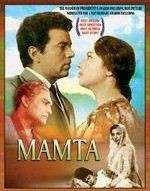Mamta (1966 film)
| Mamta | |
|---|---|
 DVD cover | |
| Directed by | Asit Sen |
| Produced by | Charu Chitra |
| Written by | Nihar Ranjan Gupta (story) |
| Starring |
Suchitra Sen Ashok Kumar Dharmendra |
| Music by | Roshan |
| Cinematography | Anil Gupta |
| Edited by | Tarun Dutta |
| Distributed by | Chhayabani |
Release dates | 1966 |
Running time | 160 minutes |
| Country | India |
| Language | Hindi |
Mamta is a 1966 Hindi film, directed by Asit Sen, with music by Roshan.[1] The movie starred Suchitra Sen, Ashok Kumar and Dharmendra. The film about middle class fears and class conflict, has lead actress Suchitra Sen in a double role. The film is also noted for its music by Roshan and lyrics by Majrooh Sultanpuri, in songs like, Rahen Na Rahen Hum sung by Lata Mangeshkar and her hit duet, Chuppa Lo Yun Dil Mein Pyar Mera with Hemant Kumar.[2] The film performed "above average" at the box office.[3] The film was remake of Asit Sen's own earlier Bengali film, Uttar Falguni (1963), also starring Suchitra Sen,[4] which had won the 11th National Film Award for Best Feature Film in Bengali.[5]This was remade in Tamil as Kaaviya Thalaivi.
Plot
Monish Rai (Ashok Kumar) comes from a wealthy family, and is in love with Deviyani (Suchitra Sen), who is poor. Monish has to travel abroad to further his education in law, but promises to stay in touch with Deviyani. After his departure, financial problems overwhelm Deviyani and her father. She approaches Monish's mother for financial assistance, but is refused. In desperation, Deviyani's father marries her off to a much older man, Rakhal Bhattacharya, who has loaned money to Deviyani's father. Rakhal is also an alcoholic and frequents prostitutes.
Deviyani becomes pregnant and gives birth to a baby girl, Suparna. Unhappy with her marriage and her circumstances, she runs away, and becomes a devadasi, or temple dancer, performing for a male clientele. She is however found by Rakhal, who blackmails her for money, and who attempts to kidnap Suparna on more than one occasion. Deviyani approaches Mother Mary, the Mother Superior of a convent and leaves Suparna in her care. Deviyani subsequently disappears. When Monish returns to the city, he thinks he has seen Deviyani, but is told by others that the person he has seen is a Lucknow-based prostitute, Pannabai.
Is Deviyani still alive? Who is Pannabai? What happened to Suparna?
The movie relates the story of Deviyani's life and revolves around the theme of "mamta" - motherhood, or a mother's love, what a mother does for the protection and well-being of her child, and all the sacrifices made by her in order that her child can live a life filled with status, dignity and love .
Veteran actress (Suchitra Sen) portrays the double role both of Deviyani and Suparna.
Cast
- Dharmendra ... Barrister Indraneel
- Suchitra Sen ... Devyani - Pannabai / Suparna
- Ashok Kumar ... Monish Rai
- Bipin Gupta ... Kantilal
- David Abraham ... Doctor Abraham
- Tarun Bose ... Mahadev Prasad
- Pahadi Sanyal ... Prosecuting Lawyer
- Pratima Devi ... Mother Mary
- Kalipada Chakraborty ... Rakhal Bhattacharya
- Chhaya Devi ... Minabai
- Rajlakshmi Devi ... Guest at party
- Chaman Puri ... Ghishta Babu - Devyani's dad (uncredited)
Nominations
- Filmfare Nomination for Best Film
- Filmfare Nomination for Best Director - Asit Sen
- Filmfare Nomination for Best Actress - Suchitra Sen
- Filmfare Nomination for Best Story - Nihar Ranjan Gupta[6]
Music
The songs of the films were composed by Roshan and written by Majrooh Sultanpuri.
| No. | Title | Singer(s) | Length |
|---|---|---|---|
| 1. | "Chahe To Mera Jiya Lele" | Lata Mangeshkar | 03:53 |
| 2. | "Chupa Lo Yun Dil Mein Pyar Mera" | Lata Mangeshkar, Hemant Kumar | 03:11 |
| 3. | "Hum Gavanwa Na Jayibe Ho" | Lata Mangeshkar | 04:20 |
| 4. | "Instrumental" | – | 02:44 |
| 5. | "Instrumental" | – | 04:05 |
| 6. | "Rahen Na Rahen Hum (solo)" | Lata Mangeshkar | 04:24 |
| 7. | "Rahen Na Rahen Hum (duet)" | Mohammed Rafi, Suman Kalyanpur | 02:20 |
| 8. | "Rahte The Kabhi Jinke" | Lata Mangeshkar | 03:43 |
| 9. | "In Baharon Mein" | Asha Bhosle, Mohammed Rafi | 03:21 |
References
- ↑ Peter Cowie (1977). World Filmography: 1967. Fairleigh Dickinson Univ Press. pp. 264–. ISBN 978-0-498-01565-6. Retrieved 23 February 2015.
- ↑ "Blast From The Past: Mamta (1966)". The Hindu. 2 April 2010. Retrieved 29 April 2013.
- ↑ http://boxofficeindia.com/showProd.php?itemCat=172&catName=MTk2Ng==
- ↑ "Asit Sen Profile". Upperstall. Retrieved 29 April 2013.
- ↑ "11th National Film Awards". International Film Festival of India.
- ↑ 1st Filmfare Awards 1953
External links
- Mamta at the Internet Movie Database